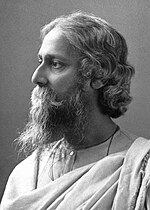Portal:India/Today's selected article/February 22, 2007
| This page is currently inactive and is retained for historical reference. Either the page is no longer relevant or consensus on its purpose has become unclear. To revive discussion, seek broader input via a forum such as the village pump. |
Rabindranath Tagore (May 7, 1861 – August 7, 1941), also known by the sobriquet Gurudev, was a Bengali poet, Brahmo (syncretic Hindu monotheist) philosopher, visual artist, playwright, composer, and novelist whose avant-garde works reshaped Bengali literature and music in the late 19th and early 20th centuries. A celebrated cultural icon of Bengal, he became Asia's first Nobel laureate when he won the 1913 Nobel Prize in Literature.
A Calcuttan Pirali Brahmin by birth, Tagore began writing poems at the age of eight; he published his first substantial poetry — using the pseudonym "Bhānusiṃha" ("Sun Lion") — in 1877 and wrote his first short stories and dramas at age sixteen. His home schooling, life in Shelidah, and extensive travels made Tagore an iconoclastic pragmatist; however, growing disillusionment with the British Raj caused the internationalist Tagore to back the Indian Independence Movement and befriend Mahatma Gandhi. Despite the loss of virtually his entire family and his regrets regarding Bengal's decline, his life's work — Visva-Bharati University — endured. (more...)
Recently appeared: Mumbai – Indo-Pakistani War of 1965 – Sikkim
